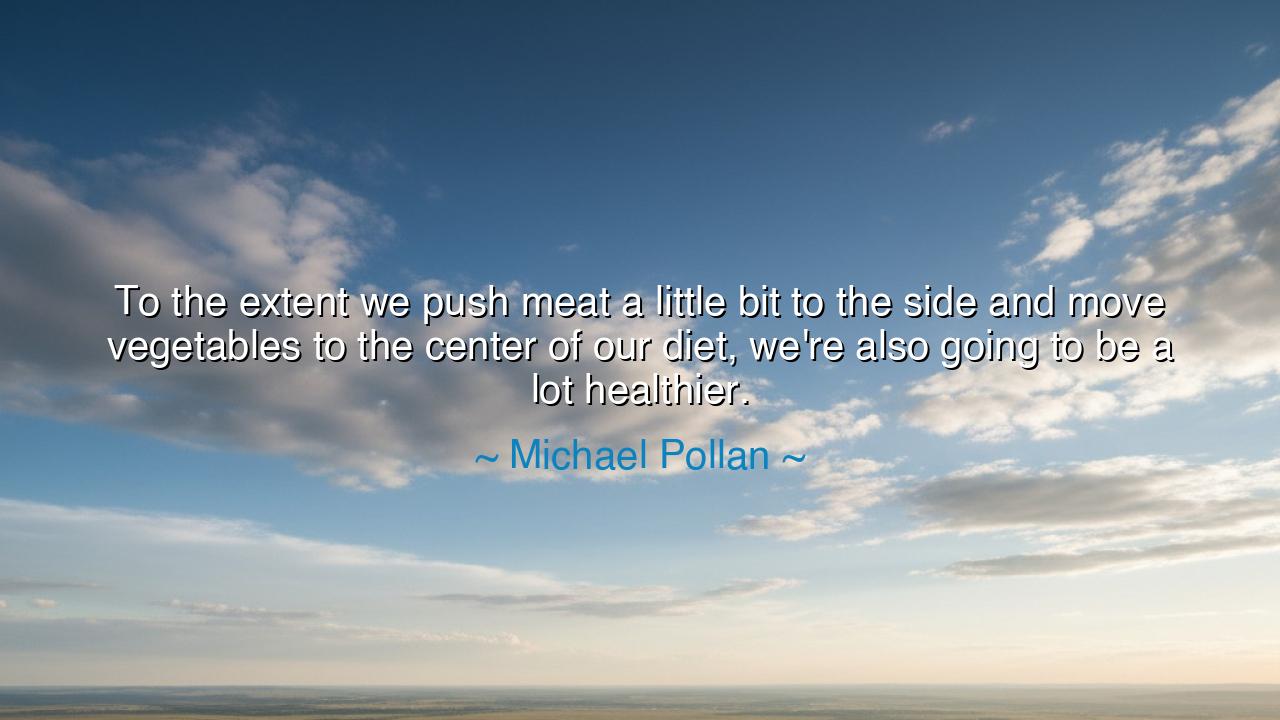
To the extent we push meat a little bit to the side and move
To the extent we push meat a little bit to the side and move vegetables to the center of our diet, we're also going to be a lot healthier.






In the ancient pursuit of wisdom and well-being, the health of the body was never seen as a mere afterthought but as a reflection of the balance between nature and the human spirit. The words of Michael Pollan—"To the extent we push meat a little bit to the side and move vegetables to the center of our diet, we're also going to be a lot healthier"—speak to this age-old truth: the way we nourish ourselves shapes not only our physical health but the very energy and vitality that guide our journey in life. The ancients, who understood the interconnectedness of mind, body, and spirit, often spoke of the importance of maintaining harmony within the body, for in its health lies the strength of the soul.
The great Hippocrates, often called the father of medicine, famously declared, "Let food be thy medicine and medicine be thy food." These words, resonating through the centuries, remind us that the foundation of well-being is not found in elaborate potions or miraculous cures, but in the simple, daily act of what we choose to eat. To push meat to the side and place vegetables at the center of our diet is not a revolutionary concept but a return to the wisdom of the ancients, who understood that the most nourishing foods come from the earth. Vegetables, rich in nutrients, carry the very essence of life, the energy of the sun and the soil. They were, and remain, the foundation of a healthy, balanced diet.
In ancient Rome, the famous statesman and philosopher Cicero often spoke of the simplicity and moderation in living. While he enjoyed the rich and opulent feasts of Roman society, he was also mindful of the balance in his diet. He understood that while meat was a source of strength, it was in the simple fruits and vegetables that true vitality could be found. The Romans, though known for their extravagant tastes, also cultivated gardens of vegetables and fruits, seeing them as essential to maintaining the health and longevity necessary to fulfill their duties as citizens and leaders. Cicero’s wisdom in moderation reflects Pollan’s modern counsel to move vegetables to the center of our meals—not as a mere dietary trend but as a return to balance, a nod to the foundational practices that have sustained humanity for millennia.
Consider, too, the story of the great Pythagoras, the philosopher and mathematician, who believed deeply in the power of food to shape the soul and the body. Pythagoras is often credited with promoting a vegetarian diet, believing that a simple and plant-based diet brought clarity of mind and purity of spirit. In his teachings, he encouraged his followers to embrace the earth’s bounty—grains, fruits, and vegetables—while shunning the indulgence in meat, which he believed clouded the mind and dulled the spirit. Though the specifics of his teachings were as much spiritual as they were physical, they reflect the ancient wisdom that a diet centered on nature’s simplest offerings fosters both mental clarity and spiritual strength.
Pollan’s statement is not merely about food choices; it is a call to return to balance, to moderation, and to a way of life that honors the gifts of the earth. Our modern society has become accustomed to excess, to the rich indulgence of meats and processed foods that fill our plates but leave us wanting more. This excess, this imbalance, has led to the rise of chronic diseases, the decline of vitality, and the degradation of our environment. Vegetables, humble though they may be, represent the antidote to this imbalance. They are a source of nourishment and healing, and by placing them at the center of our diets, we return not only to health but to the rhythms of nature itself.
The lesson here, then, is profound and simple: to nourish the body, we must respect the balance between indulgence and restraint. By pushing meat to the side and embracing the abundance of vegetables, we honor the ancient practices of moderation and respect for the earth. We recognize that health is not found in extremes, but in the daily choices we make that allow us to thrive, not just survive. Pollan’s words, when examined through the lens of ancient wisdom, become a timeless reminder that the foundation of health is rooted not in fleeting trends, but in the principles of balance, simplicity, and respect for the earth’s gifts.
In our own lives, we can take this lesson to heart. Let us strive to place vegetables at the center of our meals, to eat with moderation, and to recognize that the true path to health is one that embraces the natural world and its rhythms. As we cultivate this practice, we not only honor our bodies, but we align ourselves with the timeless wisdom of those who came before us. In balance, in simplicity, we find strength, and in our meals, we reconnect with the very essence of life itself. Let us choose wisely, let us eat well, and let us live in harmony with the world around us.






AAdministratorAdministrator
Welcome, honored guests. Please leave a comment, we will respond soon